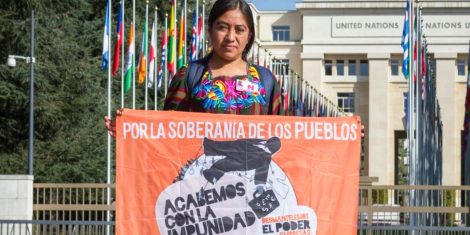A new round of negotiations began at the UN in Geneva on Monday, to agree on a legally Binding Treaty that would force transnational corporations to respect human rights. The negotiators will now begin discussing the text of the articles of this future legal tool.
“We want to reaffirm once more the historical importance of this process for a Binding Treaty that allows once and for all to stop the impunity of transnational corporations and ensure access to justice for those affected”, said Karin Nansen,Chair of Friends of the Earth International at the plenary session on Monday.
Environmental and #HumanRights [1] defenders are on the frontline of resisting the offensive of transnational corporations, enduring systematic attacks of intimidation, silencing and elimination – a criminal strategy used to impose the power and profit of TNCs | #BindingTreaty [2] Now! pic.twitter.com/GW7mWZUiYk [3]
— Friends of the Earth International (@FoEint) October 14, 2019 [4]
With pressure mounting from social movements and organizations across the world, in 2014 the UN Human Rights Council, at its “Palais de Nations” headquarters in Geneva approved Resolution 26/9. An open-ended working group was thus created with the participation of whichever States that choose to participate to negotiate a Binding Treaty on transnational corporations and human rights abuses.
In 2015 the first round of negotiations was held, which have continued year after year. This week, the fifth session of negotiations began, dealing with the text of each of the articles of this Treaty, and taking as a basis the “Draft 1” presented by the Ecuadorian Chair of the working group.
What are the main issues of concern for social movements and organizations?
When Ecuador presented “Draft 1” in July of this year, the Global Campaign to Dismantle Corporate Power and Stop Impunity [5], which gathers social movements and organizations pushing in favor of the Treaty, welcomed the document. They also expressed a concern that the text does not respect the 2014 Resolution or the years of negotiations that followed.
“The attempts to establish the supremacy of human rights over corporate logic are not covered in the entire text of the Draft 1”, said lawyer Manoela Roland of the Human Rights and Business Center (HOMA) of Brazil [6] in an interview with Real World Radio in July. “In addition, the scope of the future Treaty has been broadened, now establishing the possibility to hold all businesses accountable, not just transnational corporations”, she added.
The primacy of human rights and the scope (focus) of the Treaty on transnational corporations are two of the seven issues that are most important for the Global Campaign this week in Geneva. The different social organizations in the Campaign are gathered in Geneva to participate in the negotiations, hold side events and demonstrations in the streets.
The other five fundamental issues for the Campaign revolve around: direct obligations for corporations; joint liability (that the Treaty must cover all activities along the corporate supply chain); an International Human Rights Court to ensure the enforcement of the new instrument; the rights of affected people and communities; and protection against corporate capture of the negotiations on the Treaty and its implementation.
Activist Alberto Villarreal, from Friends of the Earth Latin America and the Caribbean, said: “It is critically important that the Binding Treaty maintains the scope on transnational corporations and other business enterprises with transnational activities. The text must cover the primacy of human rights legislation over trade and investment legislation.”
In a similar vein, Erika Mendes, from Justiça Ambiental – Friends of the Earth Mozambique, stressed that “An implementation mechanism is a crucial demand for the Africa region, so we have produced a concrete proposal for an International Court for Human Rights. We need a strong Treaty with a strong enforcement mechanism”.
Erika highlighted that “direct legal obligations in the Treaty are also a very important point, because African states are often complicit with transnational corporations or completely powerless to fight them.”
Finally, Yuyun Harmono from Friends of the Earth Asia Pacific said: “We ask the parties negotiating here in Geneva to listen to the voice of the people. I hope they don’t listen to the voice of the corporations, because corporations have a lot of privilege, but the peoples must be the ones they listen to.” Transnational corporations have “created ecological disaster in Indonesia. Lots of peoples, women, children and elderly people are impacted directly by the haze of the forest fires. They are the victims of these companies.”
.
